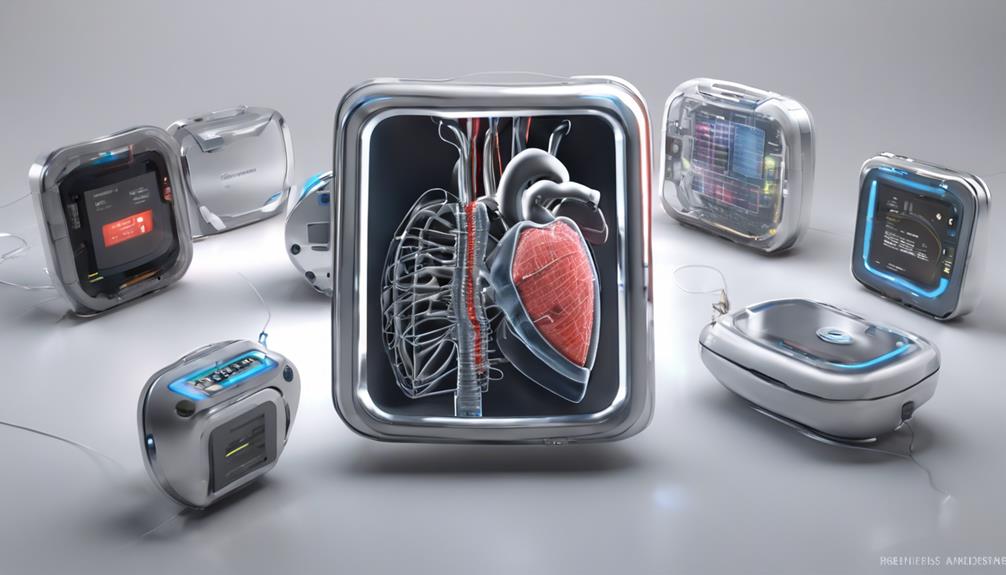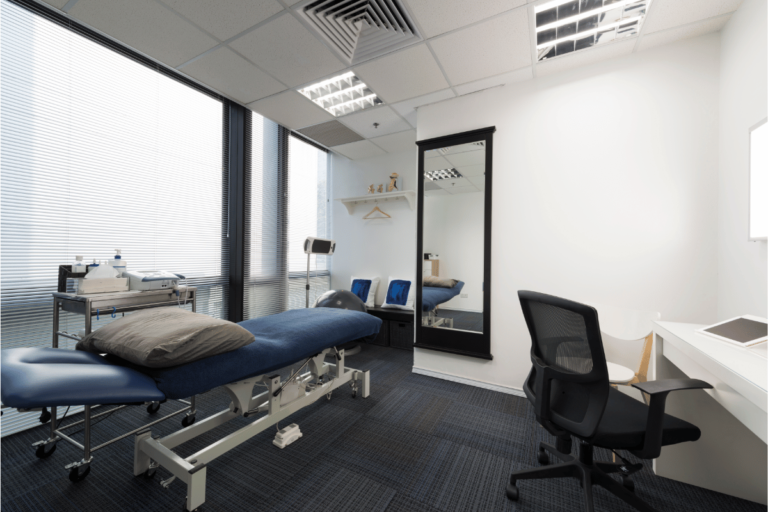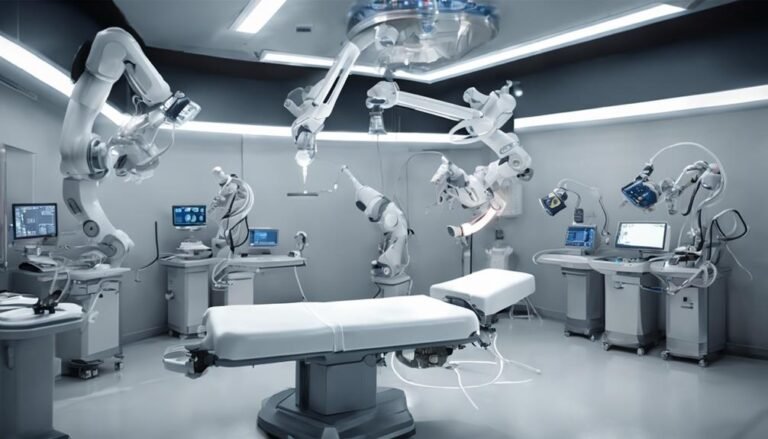Pacemaker Developments Review: Pacing Towards the Future
Innovations in pacemaker technology focus on wireless connectivity, remote monitoring, and prolonged battery life. Miniaturization efforts lead to more efficient, less invasive devices. Customized treatments tailored to patients' genetic profiles reduce unnecessary interventions. These advancements aim to revolutionize cardiac care and enhance patient outcomes through personalized approaches and proactive interventions. The future of pacemakers holds promise for improved quality of care and patient engagement. Explore the exciting developments shaping the future of pacemakers for cutting-edge advancements in cardiac technology.
Key Takeaways
- Integration of wireless connectivity enhances pacemaker functionality
- Remote monitoring enables real-time data transmission and adjustments
- Miniaturization leads to less invasive procedures and improved comfort
- Personalized approaches in cardiac care cater to individual patient needs
- Advancements drive better patient outcomes through tailored interventions
Evolution of Pacemaker Technology
Explore how pacemaker technology has advanced through the years, revolutionizing cardiac care and patient outcomes. One significant development in pacemaker technology is the integration of wireless connectivity. This innovation allows for seamless communication between the pacemaker and external devices, enabling healthcare providers to monitor and adjust the device remotely. By utilizing wireless connectivity, patients can now receive timely updates and adjustments without the need for frequent in-person visits, enhancing convenience and quality of care.
Moreover, advancements in energy efficiency have been pivotal in improving pacemaker technology. Modern pacemakers are designed to optimize energy consumption, prolonging battery life and reducing the frequency of replacements. Enhanced energy efficiency not only benefits patients by decreasing the need for surgical interventions but also contributes to the sustainability of cardiac care practices.
Remote Monitoring Capabilities
With the integration of wireless connectivity in pacemaker technology, remote monitoring capabilities have greatly enhanced the ability for healthcare providers to monitor and adjust devices without the need for frequent in-person visits. Telemedicine integration plays a pivotal role in this advancement, allowing real-time data transmission from the pacemaker to healthcare providers, enabling prompt intervention when necessary. Through telemedicine integration, healthcare professionals can remotely access a patient's device data, including heart rhythm trends and device performance, ensuring timely adjustments and personalized care.
However, with these benefits come significant data security concerns. As pacemakers become more connected, ensuring the privacy and security of patient data becomes paramount. Healthcare providers must implement robust encryption protocols and secure networks to safeguard sensitive information from potential cyber threats. Additionally, patients must be educated on the importance of data security and privacy measures to mitigate risks associated with remote monitoring capabilities. By addressing these concerns, the integration of remote monitoring in pacemakers can continue to revolutionize patient care while ensuring data security and patient confidentiality.
Miniaturization for Enhanced Efficiency
As pacemaker technology continues to evolve, the focus now shifts towards miniaturization for enhanced efficiency in device performance and patient outcomes. Miniaturization benefits in pacemakers are substantial, allowing for smaller devices to be implanted with less invasive procedures. These smaller devices provide enhanced comfort for patients and reduce the risk of complications post-implantation. Additionally, miniaturization enables improved battery life, ensuring longer device longevity and fewer replacements over a patient's lifetime.
Future applications of miniaturization in pacemakers are promising. Advancements in microtechnology are driving the development of even smaller devices that can offer the same level of functionality as current models. These future pacemakers may incorporate additional sensors for more precise monitoring of cardiac activity and integration with other health monitoring systems. Besides, the reduced size of these devices opens up possibilities for new implantation sites within the body, enhancing versatility and customization for individual patient needs.
Personalized Approaches in Cardiac Care
In the domain of modern cardiac care, tailoring treatments to individual patients' specific needs and characteristics has become increasingly paramount. The shift towards individualized treatment approaches is rooted in the principles of precision medicine, where therapies are customized based on a patient's unique genetic makeup, lifestyle factors, and disease progression. This personalized approach aims to optimize treatment outcomes by addressing each patient's specific requirements, thereby improving overall efficacy and reducing potential risks associated with standard treatments.
Precision medicine in cardiac care involves the careful analysis of data from various sources, such as genetic testing, diagnostic imaging, and patient history, to create tailored treatment plans. By leveraging advanced technology and data analytics, healthcare providers can better predict how patients will respond to specific interventions, leading to more targeted and effective therapies. This proactive approach not only enhances patient outcomes but also minimizes unnecessary procedures and medications, ultimately improving the quality of care provided.
Embracing individualized treatment strategies in the domain of cardiac care represents a significant advancement towards more patient-centered and efficient healthcare delivery. By embracing precision medicine, healthcare professionals can better meet the diverse needs of their patients, ultimately leading to improved overall health outcomes and enhanced quality of life.
Advancements Driving Better Patient Outcomes
Advancing technologies and data-driven insights are revolutionizing cardiac care, driving improved patient outcomes through tailored and targeted interventions based on individual characteristics and needs. By leveraging patient engagement strategies and sophisticated data analytics, healthcare providers can now offer personalized treatment plans that enhance the quality of care and outcomes for individuals with cardiac conditions.
| Patient Engagement Strategies | Benefits |
|---|---|
| Interactive Apps for Monitoring | Encourages self-care and adherence to treatment plans |
| Remote Monitoring Devices | Enables real-time data collection for proactive intervention |
| Educational Workshops | Empowers patients with knowledge for better decision-making |
| Support Groups | Fosters emotional well-being and a sense of community |
| Telemedicine Consultations | Enhances accessibility to healthcare professionals for continuous support |
These advancements not only improve patient satisfaction and compliance but also enable healthcare providers to deliver more effective and efficient care. Through the integration of patient engagement initiatives and data analytics, the future of cardiac care is promising, offering personalized solutions that prioritize individual well-being and long-term health outcomes.
Conclusion
As you reflect on the advancements in pacemaker technology, you may question the accessibility and affordability of these cutting-edge devices. However, rest assured that ongoing research and development are focused on making these innovations more widely available to patients.
Embrace the future of cardiac care with confidence, knowing that these advancements are driving better outcomes and improving the quality of life for individuals with heart conditions.







